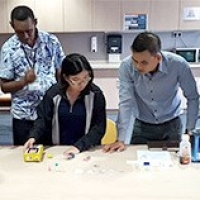03 Oct 2017

3 October 2017 - The Government of Singapore and UNODC recently teamed up to combat the growing and global challenges posed by new psychoactive substances (NPS).
A joint training programme on "Regional Law Enforcement in New Psychoactive Substances" was conducted in Singapore from 4 to 8 September 2017. Participating were 23 officials from 11 South-East Asian and Pacific Island countries, including Brunei, Cambodia, Fiji, Kiribati, Laos, Malaysia, Nauru, Solomon Islands, Thailand, Vanuatu and Viet Nam.
As a pilot initiative developed by Singapore and UNODC, the programme helps developing countries in the region achieve their development goals, including the 2030 Agenda for Sustainable Development. It also supports the implementation of the relevant operational recommendations outlined in the Outcome Document of the 2016 United Nations General Assembly Special Session on the World Drug Problem (UNGASS), which called for Member States to adopt measures to address the challenges posed by NPS.
At this occasion, Member States also called for a balanced approach to the world drug problem: putting people first through approaches that attend to health and human rights, and promote the safety and security of all our societies. This reaffirms the emphasis on the health and welfare of humankind that is the founding purpose of the international drug conventions.
In a statement earlier this year, UNODC Executive Director,Yury Fedotov, said: "Let us be clear, the threat of NPS is very real. NPS, including fentanyl analogues, continue to multiply and evolve. Fentanyl analogues for example, are helping to fuel tragic increases in opioid overdoses."
In this regard, experts and law enforcement practitioners from Singapore, UNODC staff and invited speakers from the United States Drug Enforcement Administration and Australian Federal Police shared their expertise in areas such as legislative responses, forensic identification, field detection, enforcement and diversion of precursor chemicals.
Representing UNODC at the training programme, the Office's Laboratory and Scientific Section Chief, Justice Tettey, said: "Identifying the NPS on the market, including how they are presented on drug markets, is critical to understanding the nature of the threat and in formulating effective law enforcement and health interventions. Unfortunately, the identification and detection of NPS remains one of the biggest challenges we face in addressing the problem."
The programme also included site visits to a Health Sciences Authority laboratory for forensic identification, to the Ministry of Home Affairs Office of the Chief Science and Technology Officer (MHA OCSTO) laboratory for identification of a clandestine laboratory setup.
The course allowed participants to gain a better understanding of the recent trends in the global and regional markets for NPS, and to identify best practices in its detection and investigation.
Speaking about the programme, Ronny Saohu Horo, Senior Foreign Relations Officer at the National Security Department of the Solomon Islands said: "I learnt about how new drugs emerge in the market and evolve over time." "I also had the chance to see machines used to detect drugs and laboratory testing. This puts me in a position to do more in preventing drugs," he added.
Similarly, Socheat Khiev, Deputy Director of Cambodia's National Authority for Combating Drugs said: "The course is interesting and helps to improve my knowledge to bring back home. We can have more of such courses."
The course was conducted under the auspices of the Singapore Cooperation Programme, which is the country's primary platform in extending technical assistance to the developing world. Over 170 countries and territories have taken part in the programmes since its inception in 1992.
Further information: